Does Bernie Sanders surge threaten Hillary?
- Published
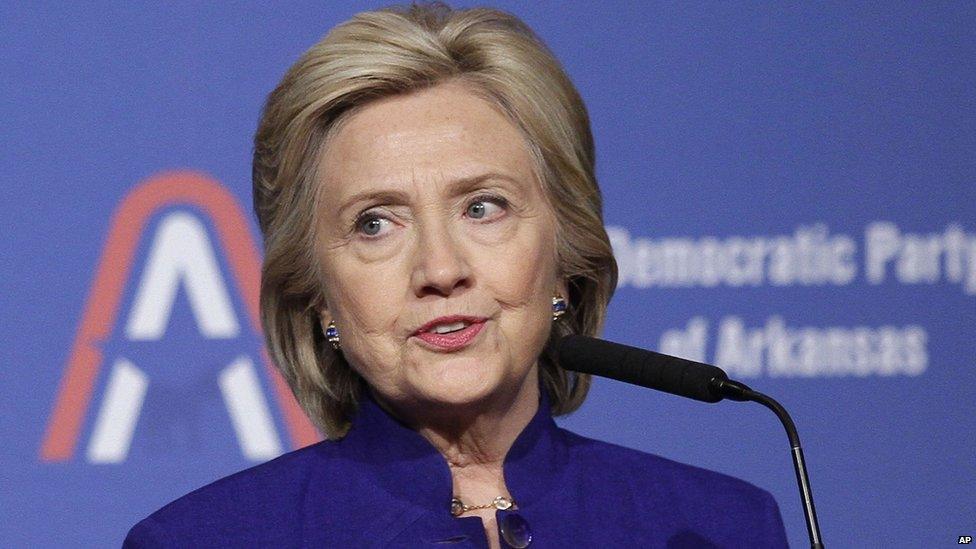
Former Secretary of State Hillary Clinton may be the prohibitive favourite to win the Democratic presidential nomination in 2016, but that doesn't mean the political ground beneath her feet is solid.
In 2008 and again in 2012 a liberal coalition, external of minorities, college-educated whites and single women gave Barack Obama more than enough votes to comfortably win the presidency. Can it hold fast after he exits the stage next year?
A two-term presidency can paper over a host of fissures within a political movement. The longer a party stays in power, the more competing interests are liable to grow dissatisfied with their share of the governing pie.
Sometimes the centre holds. In 1988, for instance, George HW Bush rode to power on the strength of the Ronald Reagan governing coalition. By 1992, however, the foundation had given way, as fiscal and social conservatives revolted, ushering in eight years of Democratic rule and pushing the Republican Party farther to the right.
At the Netroots Nation conference of left-wing activists in Phoenix, Arizona, last week, the fault lines within today's Democratic Party were on full display. And while Mrs Clinton was more than a thousand miles away, honouring "prior commitments" in Iowa and Arkansas, the events that transpired in the desert this weekend should give her pause.

There's no question, for instance, that the enthusiasm and support for Vermont Senator Bernie Sanders' insurgent presidential campaign is real. He's climbed in polls, external over the past few weeks, and on Saturday night 11,000 turned out to hear the firebrand socialist give one of his 60-minute stem-winders.
On the menu was a heavy dose of liberal red meat - including condemnation of the "billionaire class" and calls for higher taxes on the wealthy, expanding government-run healthcare programmes, raising the minimum wage and tuition-free college education.
"Bernie Sanders stands up for what's just and right," says conference attendee Jean Devine of Phoenix. "He's for the Democratic ideals of equality for all people and for the rich not being able to buy elections."
While in Arizona, campaign supporters hoisted banners and toasted their man at a local nightclub with cleverly named cocktails like "Weekend at Bernie's" and "Vermont Treehugger" (with maple syrup-infused whiskey).
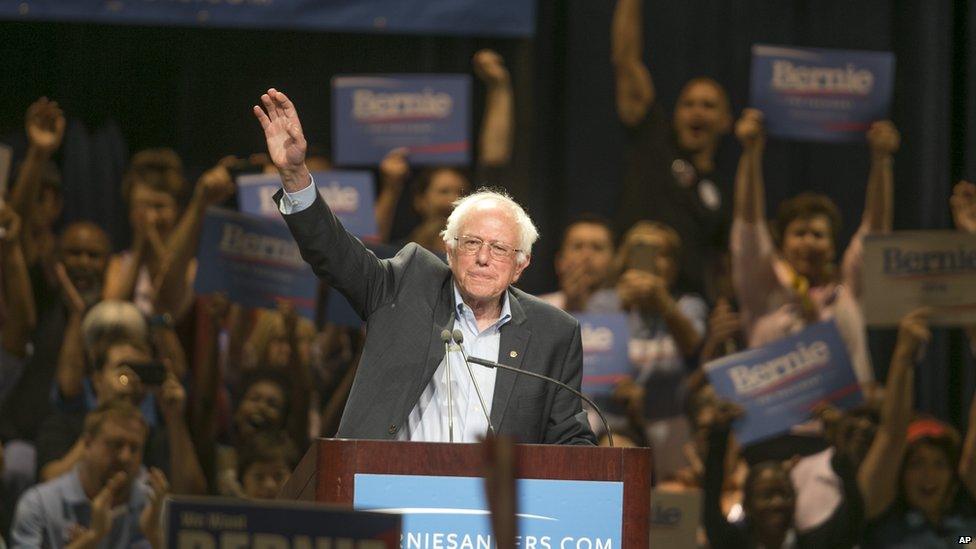
Bernie Sanders sets a record in Phoenix for the largest crowd at a political rally this year
There was a point in time when Mrs Clinton was the cool Democrat. She had her own internet meme, external. She was near universally beloved by party faithful. Now, however - at least among the rank and file at Netroots Nation - Mr Sanders is the candidate of the hour.
The Vermont senator has given voice to the frustration and anger that some on the left feel over the current state of US politics. They helped elect Barack Obama in 2008 and 2012, but their goal of enacting a full progressive agenda seems to them far from realised.
"Bernie's looking pretty good," says Hanna Roditi of Connecticut. "He's the only one who doesn't cater to corporations. The policies that he supports have more to do with people's needs."
The most common adjectives used to describe Mrs Clinton in Phoenix, on the other hand, were "calculating," "cautious" and "corporate".
"I won't vote for her," Roditi says, adding that if Mr Sanders doesn't win the Democratic nomination she'll write in his name on the general election ballot.
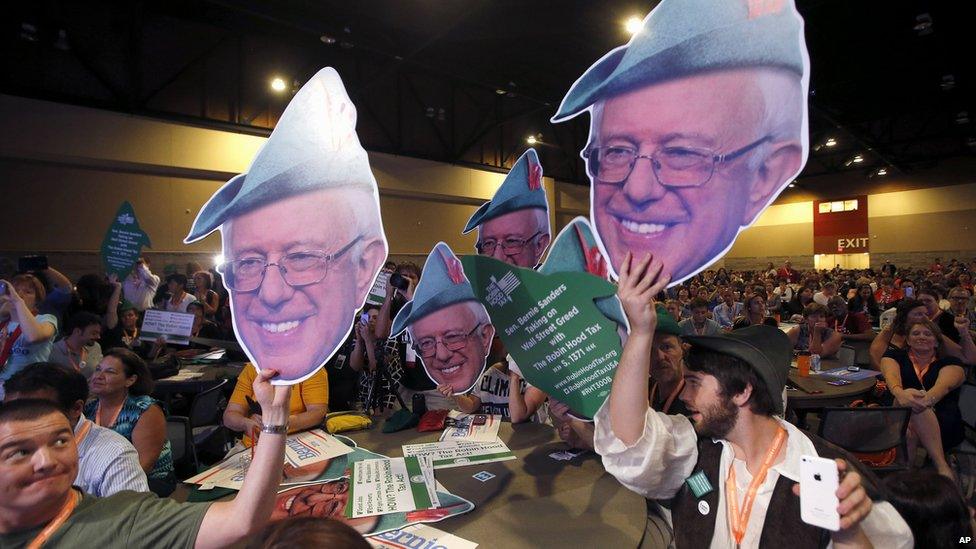
Bernie Sanders supporters cheer their man at the Netroots Nation conference in Phoenix
The establishment - whether in the government or the Democratic Party - was a source of anger time and again at the conference. During a Thursday afternoon panel discussion, EJ Juarez, director of Progress Majority Washington - singled out Democratic campaign managers in particular for betraying their party's progressive ideals.
"We ceded a lot of the soul of our values off to contractors who don't often adopt the equity principles we talk about," he said. "They aren't talking the same language."
On Friday morning Massachusetts Senator Elizabeth Warren, a champion of the left, used her keynote address to rail against an "insider Washington" that ignores the liberal priorities of the nation at large - on issues like gun control, income inequality and tighter Wall Street controls.
"The American people are progressive, and our day is coming," she said.
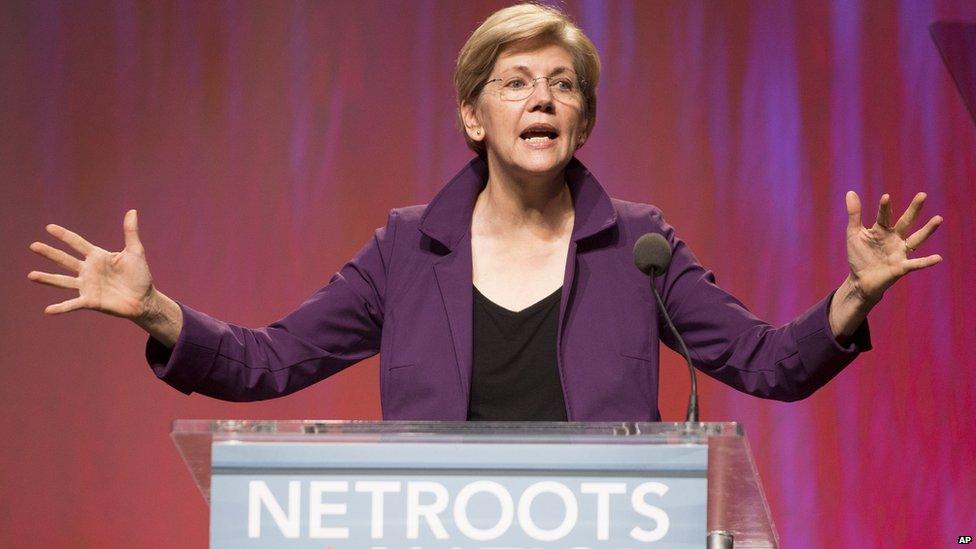
Elizabeth Warren says that American values are progressive values
After calling out the financial behemoth Citigroup by name, she said the US government - even during the Obama administration - has been dominated by Wall Street insiders. She then offered some advice for candidates seeking the presidency.
"I think that anyone running for that job - anyone who wants the power to make every key economic appointment and every key nomination - should say loud and clear we don't run this country for Wall Street and mega-corporations, we run it for people," she said to cheers.
It was likely a barb aimed at Mrs Clinton - who has been criticised by some on the left for being in the thrall of big-money donors - and set the stage for the Saturday's presidential town hall forum featuring Mr Sanders and fellow candidate Martin O'Malley.
A funny thing happened on the way to the forum, however - evidence of yet another frayed fibre in the Democratic electoral quilt.
Mr O'Malley took the stage first, and about 20 minutes into his question-and-answer session a group of several dozen protesters from the group Black Lives Matter interrupted the proceedings with chants, songs and shouts.
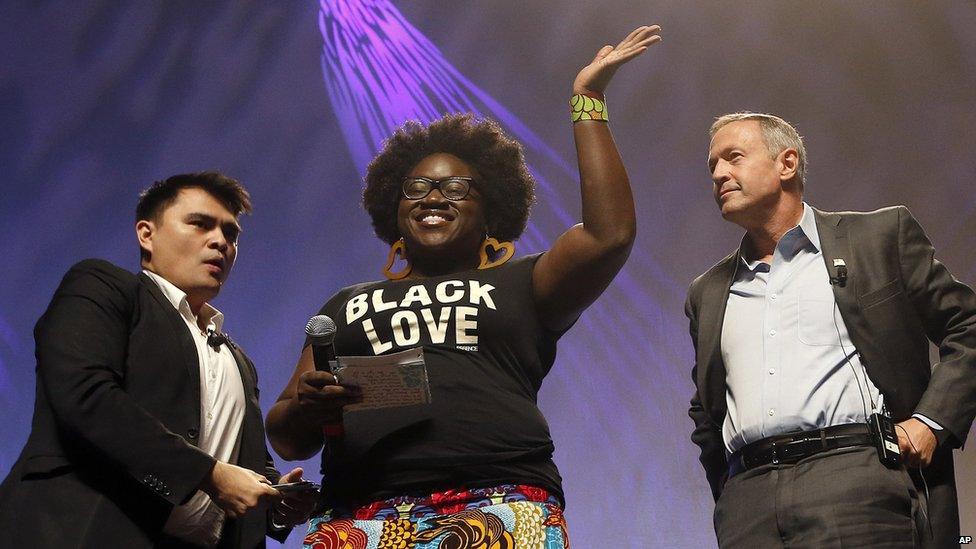
Tia Oso and Black Lives Matter protesters interrupt Martin O'Malley's town hall forum
Tia Oso, leader of the Black Alliance for Just Immigration, commandeered a microphone and asked the former Baltimore mayor what he would do to "begin to dismantle structural racism in the United States".
Mr O'Malley was met by boos when he said: "Black lives matter. White lives matter. All lives matter." (He would later apologise, external, saying he did not want to "disrespect" the passion and commitment of the protesters.)
The demonstrations continued for Mr Sanders. At one point the senator snapped: "If you don't want me to be here, that's OK. I don't want to outscream people". He would later cancel previously scheduled afternoon meetings with conference attendees, including one with the Black Lives Matter group.
By evening, however, the Bernie show was back. The Phoenix conference centre was packed with the campaign loyalists in a display of grass-roots support outpacing even the 10,000 who turned out just weeks earlier in Madison, Wisconsin.
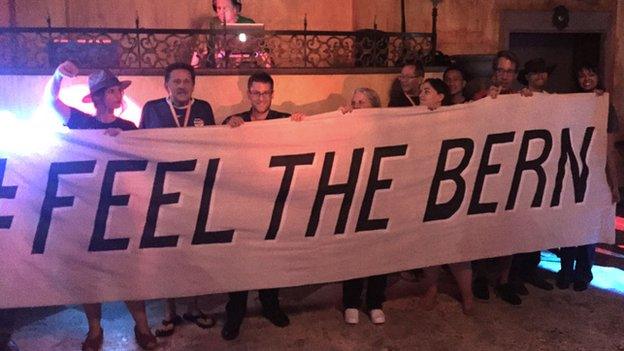
Bernie Sanders supporters rally last week at a Phoenix nightclub
Unlike that Mid-west liberal bastion, however, Arizona is decidedly conservative - an indication that the senator is drawing power across the country.
The true-believing left does have a history of rallying behind unvarnished candidates like Mr Sanders, however, and they have met with limited success. Paul Tsongas in 1992, Bill Bradley in 2000 and Howard Dean in 2004 are but a few of the men who failed to translate big crowds and energetic support into primary victories.
Mrs Clinton must hope that the Sanders campaign meets with a similar fate - and when it does, that progressive loyalists like conference attendee Pam Miles of Huntsville, Alabama return to the fold.
"Bernie Sanders says everything that I feel," Miles says. "He's a dynamo, he is a truth-teller, he speaks truth to power. I love Bernie."
She adds, however, that she'll be happy to back Mrs Clinton if she gets the nomination. She says she's keen to avoid the kind of intra-party discord that marred the Clinton-Obama battles of 2008.
"In '08 it was absolutely horrible," she says. "It broke friendships, it hurt feelings. I'm not going to do that this time."
As for the Black Lives Matters activists who became the surprise story of Phoenix, Wesley Lowery of the Washington Post asked, external Mrs Clinton how she would have responded to the protesters during a Facebook question-and-answer session on Monday.
"Black lives matter. Everyone in this country should stand firmly behind that," she replied. "We need to acknowledge some hard truths about race and justice in this country, and one of those hard truths is that that racial inequality is not merely a symptom of economic inequality. Black people across America still experience racism every day."
She went on to recommend body cameras for US police officers, sentencing reform, voting rights and early childhood education.
Unlike her Democratic competitors, Mrs Clinton had the luxury of time to respond to this latest challenge. Whether it will be enough to weather what could be a coming storm, however, remains to be seen.
- Published3 July 2013
